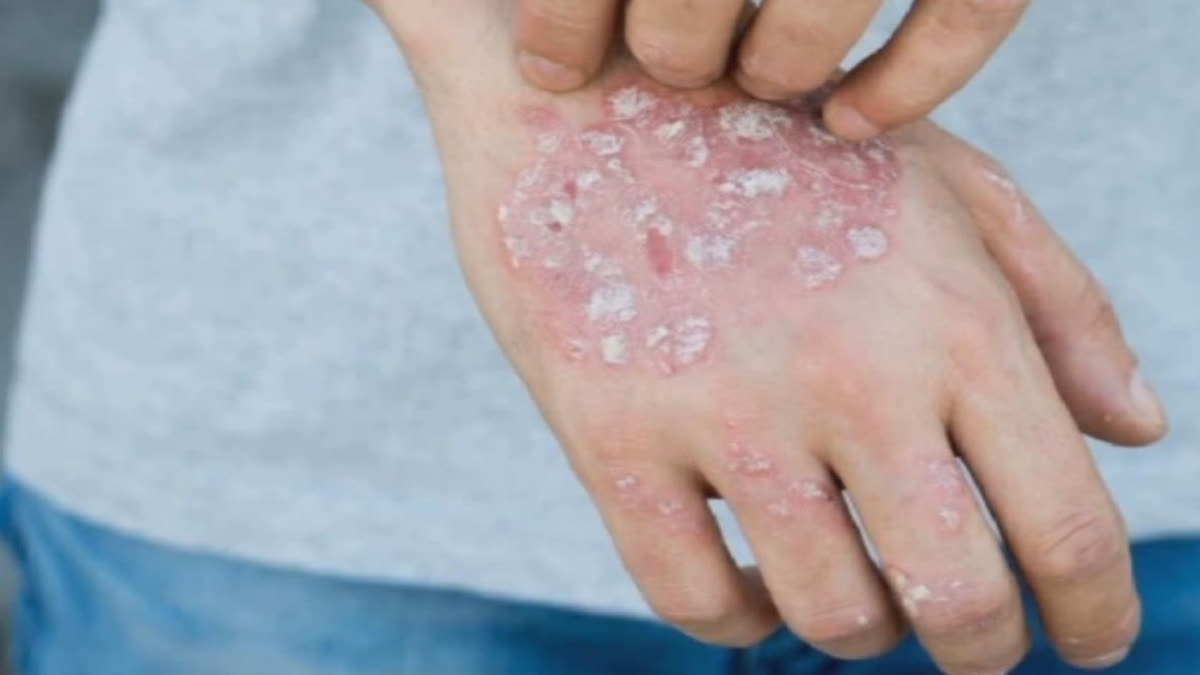Varanasi: As monsoon fury continues in many parts of the country, skin infection is one of the ailments that troubles people in the rainy season. If skin infection is not attended to in time, it can lead to a more serious condition called Psoriasis, an auto-immune disease that causes a rash with itchy, scaly patches.
Dr. Gurupara Prasad (ETV Bharat) Knees, elbows, trunk and scalp are largely impacted by Psoriasis. In this article, we will discuss psoriasis in detail and also know what causes it and how to manage and treat the same.
ETV Bharat had a special conversation with Dr. Gurupara Prasad, who is working on psoriasis at the Ayurveda Faculty of Banaras Hindu University. According to Dr Prasad, psoriasis is a serious disease which can impact both young and old. According to him, irregular lifestyle and ignoring infection can be its triggers.
Ayurveda, he said, offers the most effective treatment for this disease. Psoriasis tends to go through cycles, flaring for a few weeks or months, then subsiding for a while.
What is psoriasis
According to Dr Prasad, Psoriasis is an immune-mediated disease that causes inflammation in the body. There may be visible signs of inflammation such as raised plaques and scales on the skin.
"Normal skin cells completely grow and shed in a month but with psoriasis, skin cells multiply fast, sometimes in only three or four days. The skin cells pile up on the surface of the skin and patches start to appear on the scalp, elbow, knees etc. These are early symptoms of the disease and later on these patches can appear on other parts of the body as well," he said.
A person suffering from psoriasis suffers more from itching and burning as troubles the scalp, back, knee, elbow and foot the most.
Causes of psoriasis
- Hereditary or presence of psoriasis in the family.
- Daily intake of medicines for high blood pressure or any heart-related disease.
- Staying in bright sunlight and then suddenly getting exposed to a cold environment.
- Any skin infection.
- Living in a cold or dry environment.
- Irregularity in eating habits. Consuming contradictory foods.
Symptoms of psoriasis
- Red and pink spots on the body.
- Itching or pain.
- Excessive dandruff on the head, followed by deposition of white layer, and discoloration of nails.
- Soreness or burning in the affected part of the body.
- Swelling or pain in the joints.
- Rashes in many parts of the body.
- Dryness and whiteness in the body.
Prevention
Dr Guru Prasad said the most important way to prevent this disease is to eliminate the irregularity of life and pay special attention to our food and drinks. "Avoid consuming incompatible foods. Exercise and yoga should be a part of our daily schedule. If these two things are implemented significantly, then Psoriasis can be managed to a great extent. Some medicines are also given in this, which include Gandhaka Rasayan, Kaisor Guggul, Khadirarishta, Mahatiktak Ghrita, Patolakaturohinayadi etc.
Ayurveda is effective
Ayurveda proves to be very effective in managing and treating Psoriasis, says Dr Prasad. "We do not claim that the entire disease can be cured in one go. However, people who have been struggling with this serious disease for 8-10 years, have found a lot of relief when they started to treat it with Ayurveda.
"Many of them are now managing their daily routine work normally and are living a happy life. Ayurveda also works on the complications of the disease. "Along with this, I appeal to the people that if someone is suffering from psoriasis and it has been less than a year, he or she should contact an Ayurveda doctor as soon as possible or he can also come to BHU Ayurveda department and get treatment. Ayurveda proves to be even more effective in the initial stage," he said.
Take special care in food
Patients suffering from psoriasis need to take special care in food. For which some important points have been told. Do not consume milk and salt together. Avoid consuming milk immediately after food. Do not consume tea and salty snacks made from milk together. Avoid consuming fruits and milk together. Avoid taking protein supplements with milk. Avoid sour fruits. Avoid eating pickles and spicy things.
